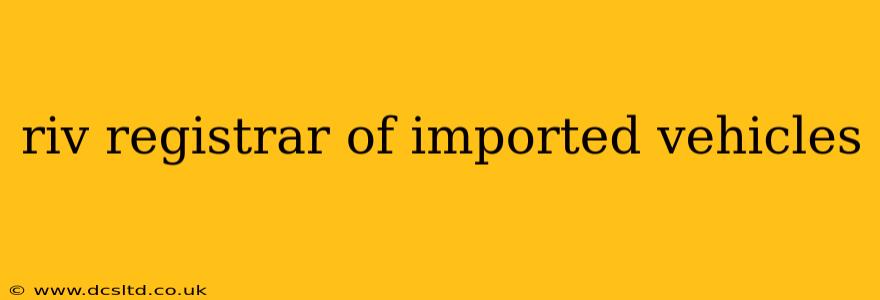The Registrar of Imported Vehicles (RIV) plays a crucial role in the process of registering imported vehicles in many countries. Understanding the RIV's function and the registration process is vital for anyone importing a car. This comprehensive guide will delve into the intricacies of the RIV and answer frequently asked questions surrounding imported vehicle registration.
What is the RIV and What Does it Do?
The RIV, or its equivalent agency, is the government body responsible for overseeing the registration and licensing of imported vehicles. Its primary function is to ensure that all imported vehicles meet the necessary safety, environmental, and regulatory standards before they can be legally driven on public roads. This often involves inspecting vehicles for compliance with emission standards, safety features, and proper documentation. The specific processes and requirements vary significantly depending on the country.
How Do I Register an Imported Vehicle with the RIV?
The process of registering an imported vehicle with the RIV (or equivalent agency) can be complex and varies widely by location. Generally, it involves several key steps:
-
Pre-Import Compliance: Before the vehicle even arrives in the country, you may need to obtain pre-approval or certification from the relevant authorities. This often entails providing detailed documentation about the vehicle's specifications and history.
-
Importation: Once the vehicle arrives, it will typically undergo customs inspection and clearance. You will need to provide various documents such as the bill of sale, proof of ownership, and import permits.
-
RIV Inspection: The vehicle will then be inspected by the RIV to ensure it meets the country's standards. This inspection might include checks on emissions, safety features, and vehicle identification numbers (VIN).
-
Payment of Fees and Duties: You'll be required to pay all applicable import duties, taxes, and registration fees. These fees can vary considerably depending on the vehicle's value, age, and type.
-
Issuance of Registration Documents: After passing the inspection and paying the required fees, the RIV will issue the necessary registration documents, allowing you to legally operate the vehicle on public roads.
What Documents Do I Need to Register an Imported Vehicle?
The required documents will vary by country, but generally include:
- Proof of Ownership: This could be a title, bill of sale, or other documentation demonstrating ownership.
- Import Permit: This permits you to legally import the vehicle into the country.
- Bill of Lading: A document detailing the shipment of the vehicle.
- Vehicle Identification Number (VIN): This unique number identifies the vehicle.
- Proof of Insurance: Evidence that you have sufficient insurance coverage.
- Customs Declaration: Documentation confirming the import customs process was completed.
What Are the Fees and Costs Involved in Registering an Imported Vehicle?
The costs associated with registering an imported vehicle vary significantly based on several factors, including:
- The vehicle's value: Higher-value vehicles generally incur higher import duties and taxes.
- Vehicle age: Older vehicles may attract different fees compared to newer models.
- Type of vehicle: The type of vehicle (car, truck, motorcycle, etc.) can impact the registration fees.
- Country-specific regulations: Each country has its own fee structure and regulations.
How Long Does the RIV Registration Process Take?
The time it takes to complete the RIV registration process can vary considerably, ranging from a few weeks to several months, depending on several factors including the volume of applications and the specific requirements for the vehicle.
What Happens if My Imported Vehicle Fails the RIV Inspection?
If your vehicle fails the RIV inspection, you'll need to address the identified issues and re-submit it for inspection. Failure to correct the deficiencies may result in the vehicle being refused registration.
Where Can I Find More Information About the RIV and Importing Vehicles?
For the most accurate and up-to-date information, it's crucial to consult the official website of the relevant regulatory agency in your specific country or region. This will provide details tailored to your location and current regulations. You should also consult with import specialists or customs brokers for assistance navigating the process.
This guide provides a general overview. The specifics of registering imported vehicles are complex and vary significantly by location. Always consult official government sources and relevant professionals for accurate and detailed information.
